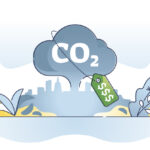September 8, 2014 – Yesterday’s published expose on Canada’s promotion of the oil sands, appearing in the Pullitzer Prize winning “Inside Climate News,” is an indictment of the country’s federal government. Having stripped away funding from its own science-based research into greenhouse gas (GHG) emissions from oil sands production, having backed out of Kyoto (the only signatory country to do so), and having lied to Canadians every day about environmental stewardship, the current federal government is no more than a front for the fossil fuel industry. And taking the lead in spreading the lies is the man pictured below, Prime Minister Stephen Harper.
Here are the facts:
- Environment Canada’s budget on research into pollution management and mitigation is being cut by 42% based on projections for fiscal 2016-17. That’s just after the next scheduled federal election.
- Science-based departments in the federal government public service are seeing 5,000 job cuts and a $3 billion reduction in funding.
- The cuts are false savings because the government has to hire private contractors any time it needs to do environmental reviews and private contractors are not on payroll but cost more in per diems than any employee.
- The federal government spent $9 million on a domestic ad campaign in 2012 to convince Canadians it was promoting growth in the economy while maintaining the highest environmental protection standards in the world.
- Fleishman-Hillard, a public relations firm, is being paid $5 million to manage an advertising campaign to promote the oil sands to the U.S. government and public. You can see one of their ads below. The firm just had its contract renewed.
- The federal government continues to delay introducing targets for reductions in GHG emissions for the fossil fuel industry. This has been ongoing for several years now with the Prime Minister sidestepping the issue repeatedly by stating that he wants to lock it in when the U.S. announces its standards. But the U.S. emission reduction targets are focused on coal-fired power plants not oil from oil sands.
- Latest forecasts from Environment Canada indicate GHGs will grow by 84% from 2012 levels by 2020. This is on top of GHG emission growth of 62% from 2005 to 2011. And even this data is suspect because the government restricts scientists from measuring emissions coming from the chimneys and pipes at Alberta and Saskatchewan sites.
- In addition to the government suppressing GHG emissions research, it is muzzling research looking at the impact of the oil sands on surrounding water, air, soil, wildlife and human populations living downstream from the extraction and processing sites.
- The government through Health Canada downplays any research that demonstrates causal links between cancer and disease rates in indigenous populations downstream from oil sands’ extraction and processing sites.

As Danielle Droitsch, the Canada Project Director for the Natural Resources Defense Council, a U.S.-based environmental action group, recently stated, “when we talk with decision makers on Capitol Hill, they…have observed that there really isn’t a difference between the government of Canada and the tar sands industry.”
So the Canadian people are being sold a bill of goods by their federal government. The American Congress looks north of its border and sees Canadians as being on board with a North American energy strategy based on oil sands and not on a responsible mix of energy sources including renewables. The Congress ignores the implications of rising production and the resulting rise in GHG emissions.
The Canadian government continues to be culpable and guilty of a massive fraud against its own citizens, the United States, and the rest of world in the effort to serve the interests of oil sands producers. To quote Emile Zola from a previous century, “J’accuse!”
J’accuse the government of Stephen Harper in perpetrating a fraud on the people of Canada regarding environmental policy.
J’accuse the government of Stephen Harper of deliberately suppressing science done by investigators from within his own Public Service who question the validity of his policy regarding oil sands development.
J’accuse the government of Stephen Harper of deliberate disregard for the safety and health of those Canadians who live in proximity to the oil sands projects.
And j’accuse the government of Stephen Harper of failing in its international obligations to address Canada’s contribution to GHGs and climate change.





















“J’accuse the government of Stephen Harper in perpetrating a fraud on the people of Canada regarding environmental policy
.
J’accuse the government of Stephen Harper of deliberately suppressing science done by investigators from within his own Public Service who question the validity of his policy regarding oil sands development
.
J’accuse the government of Stephen Harper of deliberate disregard for the safety and health of those Canadians who live in proximity to the oil sands projects.
And j’accuse the government of Stephen Harper of failing in its international obligations to address Canada’s contribution to GHGs and climate change”.
Sure, the Canadian Government is guilty of all that and more. But you are a mature student of the world’s sad history of democracy from ancient Athens’ Pericles to present times. Placing the blame for what seems fraudulent environmental indifference on the present particular group of in-power Canadian politicos doesn’t seem very even-handed. The great prize of the tar-sands wealth will certainly attract great herds of fraudulent politico swill-hogs from remote places. There will always be more swill-hogs than places at the public slop-trough. Here are some facts you didn’t mention:
The earth is very overpopulated.
That is because the global economy is temporarily sufficiently productive to support the overpopulation.
The scale of global productivity is directly related to combustion of fossil fuel; mainly coal, petroleum, and natural gas.
We need no further scientific studies to know coal combustion contributes more atmospheric carbon per unit of heat than petroleum, and that petroleum combustion contributes more atmospheric carbon per unit of heat than natural gas, which is the lowest carbon emitter we have in great abundance.
Replacing petroleum liquids transportation fuel with natural gas liquids would obviously reduce carbon emissions per unit of transportation, and for some decades the world could continue to sustain its present overpopulation levels by adding transportation fuel carbon to the atmosphere at lower rates.
The only durable solution to atmospheric carbon build-up is drastic population reduction, but the world refuses to adopt that perspective on the problem. Instead it wants to talk about windmills, solar cells, geothermal, bio-fuels, etc, all of which in the aggregate will fail to supply the additional energy demands of even the developing world, but which does pump more slop into the politicos’ hog-trough.
The world economy is going to satisfy its ever-growing demand for liquid hydrocarbon transportation fuel from somewhere, even if Canada’s tar sands didn’t exist. We are living on an overpopulated planet named Earth, not on a divinely moderated celestial kingdom of Heaven. Hence, we will do somewhat less bad with the global GHG problem if we strive to replace petroleum with natural gas. That’s where the tar sands make a positive contribution. The tar sands do not supply fuel. They supply tar. Tar is not a liquid fuel. Neither is natural gas. But in the great regional environmental insult of Athabaska tar-sand production, we can find a great global “benefit.” The tar acts as a liquefying agent for natural gas. The tar sand “upgrading” process combines the light hydrogen-rich methane molecule with the heavy hydrogen-poor tar molecule, and produces a hydrogen-rich low-viscosity liquid motor fuel, that in practical effect yields a significant percentage of its combustion heat from the natural gas supplied in the “upgrading” process. The tar-sand fuel is synthetic petroleum. When tar-sand fuel is burned it adds less carbon to the atmosphere than burning natural petroleum.
Shell’s giant Pearl plant in Qatar makes a direct conversion of the region’s natural gas into low-sulfur diesel fuel, but natural gas combustion drives the whole process. (In Qatar the natural gas is nearly free and inexhaustible) Shell is not revealing all the pertinent technical details, but in the balance I suspect tar-sand “upgrading” (methane hydrogenation of tar) pumps less carbon into the atmosphere per unit of liquid fuel produced than Shell’s Pearl plant. Synthetic fuel production will exhaust the lower-cost tar-sand reserves long before natural gas reserves run out. Then you can expect common synfuel processes to consist of “upgrading” coal into liquid by combining natural gas with coal. As long as the tar-sand reserves last, coal synfuel won’t be cost competitive.
As far into the future as anyone can plausibly see, you can expect any Canadian Government, regardless of names and faces, to increasingly drive the economy in the direction of timber, minerals, and hydrocarbon fuels.
.
Hi Allen,
Although synthetic crude may produce (and I am not sure this is accurate since the literature generally concurs that emissions from oil sands versus conventional oil are 12% greater) less carbon emissions when burned than light crude, to suggest that the oil sands can help in our conversion to a natural gas alternative to coal and oil seems ludicrous. First of all, you are not taking into account the production process which is a massive carbon polluter even as intensity reduction technologies are introduced.
And as for overpopulation, tell me how you would implement population control. Are you going to get a China one child policy agreed to by every nation. Consider Russia where the population is expected to decline by almost 40% by 2050 because of rampant alcoholism. And then consider Africa and other Developing World areas where populations are surging (UN suggests population will double in these areas from 900 million to 1.8 billion by 2050). So what would you suggest – impose a universal policy or a selective policy. Tell Africans and other parts of the Developing World, they cannot reproduce “for their own good.” The latest UN stats project a range of population between 8.3 and 10.9 billion by 2050. This variable is built on a model that says fertile women will have 0.5 more or fewer children. India’s population will surpass China’s by 2028. Will a world body impose birth restrictions on a democratic India? Nigeria’s population will exceed the U.S. by 2050 and will rival China by 2100. Will a world body enforce birth control on that West African country? The Developed World will maintain a steady state population of around 1.3 billion. That includes Europe and Anglo-North America. And to boot, life expectancy will be extended with lifespans globally exceeded 80 years by 2100. Average life expectancy in the Developed World will be 90 by then and in the Developing World 80. How will you impose population control – by culling the elderly?
Realistically, there needs to be a balance to the equation of energy use and population. Renewables make it possible to address the carbon issue. Urbanization will be the natural deterrent to Developing World population growth as it has been in the Developed World.
As for my Canadian government, I don’t know where you reside, but living in this country is like being in a bubble. We have abundant water, an endless supply of natural resources, a low population, and a government that chooses to be blind to our global responsibility.